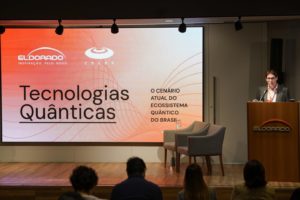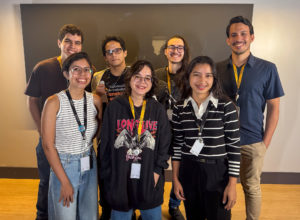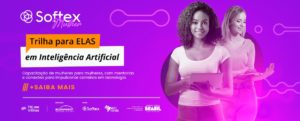Technology, the subject of the 2017 cycle of the programme Technological Workshops, has applications that go far beyond its background of financial transactions. Food tracking, smart contracts, complex data logging and identification systems are some of its possibilities.
In its first year, the Blockchain Technological Workshop will have three fronts: the academic, which aims to comprehend the standardization and the regulation of blockchain, the infrastructure, in order to assess the already available architectures to harbor that technology, such as, for instance, the Ethereum platform, and, finally, the feasible applications of blockchain, which will take place in partnership with other workshops of ELDORADO. 18 collaborators will engage in this workshop, 15 from the unit of Brasilia, 2 of Campinas and 1 of Porto Alegre.
“Through the study of this technology, we are aiming to become, in the future, a hub of knowledge in this field. Furthermore, it will allow the offering of creative, innovative, safer solutions with a low implementation cost”, Marcos Estevam, Project Leader of ELDORADO, discloses.
Currently, the main and most popular blockchain application is found in the processing of the digital coin Bitcoin. In the Bitcoin realm, a blockchain is a structuring of data which includes a financial entry. Each transaction with this currency is digitally signed and generates an unaltered, high integrity record. This happens due to the fact that these records are shared between distributed computational structures. “The solution is similar to the architecture of the first utilities created to share music files, like Napster and Kazaa, in which a file was simultaneously stored in thousands of computers, ensuring its availability. With Bitcoin, data storage follows a similar structure and the signature of each transaction is also authenticated by that large number of servers”, Estevam explains.
Technically known as distributed database architecture, this technology is viable for other applications, such as medical records, identity management, safe transactions, registry documents at registry offices, among others. Blockchain has practical and immediate applications in the verticals that are regarded as interesting for ELDORADO, such as agribusiness, gas & oil, IoT, energy, health and education. “This technology is interesting for the Institute, since it can also be embedded in several locations, a sort of virtual data chain”, Estevam reveals.
One may say that blockchain acts, simply put, as a registry book, which keeps a list of occurred events, in order and ascendingly sorted. “The blocks, the information blocks, were conceived to be inviolable and fraud-proof. Thus, this tool is able to cope with safety issues generated by digital communication, i.e., the sending of conflicting messages or requests which, in conventional architectures, would prevent a consensus among networked computers or software models”, Estevam clarifies.
Through this technology, several sorts of transactions may take place. For that, one side just needs to have an ‘asset’, something that needs to be negotiated and, to carry out this digital transfer for the other party, a network of confirmers is needed. Better known as ‘miners’, these are the ones who validate and register the transactions that take place and, as a reward, they can be ‘paid’ through new processed value units, such as virtual coins when it comes to bitcoins, or access to services, files, computational resources and others. “This is an endless and progressive cycle”, Estevam declares. After a transaction is confirmed and validated, which takes place every 10 minutes, a new block is added to the blockchain by a miner. This way, the blockchain grows in size and stores the data of all the previous transactions.
On the Technological Workshops
The Institute picks five to eight technology-related subjects to assemble a set of Workshops. Each one has the same structure of a R&D project which the Institute conducts with its partners, with an execution plan, a schedule of activities, budget, management of the human resources involved in it, empowerment events, external partnerships, goals, reports, demonstration stations and, depending on the case, an analysis of the technical-economic viability, Business Case analysis and marketing plan.
The workshops engage, approximately, 20% of the base of collaborators per year. The work encompasses three units – Campinas, Brasília and Porto Alegre, something that also contributes to the integration of the different sites. Each person works on average 4 hours per week on the project, i.e., 10% of the weekly allocation, which tallies, on average, 16 hours per month. When the subject approached is more complex and broad there is also a possibility of formal allocations, with an exclusive dedication to the studies on the technologies of the projects.
This website uses cookies so that we can provide you with the best user experience possible. Cookie information is stored in your browser and performs functions such as recognising you when you return to our website and helping our team to understand which sections of the website you find most interesting and useful.





